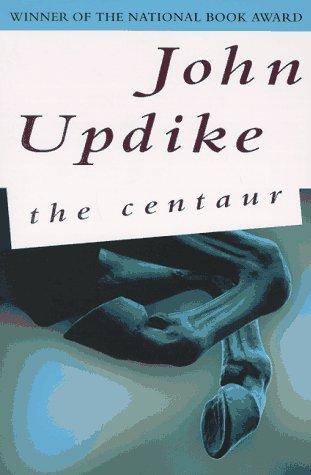Monday, November 16, 2009
The Centaur by John Updike
I never know what to expect from an Updike novel. I've read some that I loved and some I just hated, which I suppose is to be expected with any author so prolific (Updike has written more than 50 books). Glancing over The Centaur before I began reading, I thought I was in for what New York Times book reviewer Orville Prescott called a "laborious construction of mythological puzzles...sabotaged by pomposity and tedium." I must say, though, I was pleasantly surprised.
Updike weaves the story of a disillusioned schoolteacher, George Caldwell, and his son, Peter, in 1940s rural Pennsylvania with the parallel myth of Chiron and Prometheus. Chiron, noblest of all the Centaurs, wandered the world in agony after being accidentally wounded by a poisoned arrow. So tormented with pain, Chiron begged the gods that he might die in place of Prometheus, the Titan who stole fire to give it to humans. After Chiron's death, Zeus made him a constellation.
George Caldwell, too is injured by an arrow: a dart from his tormenting students catches him in the ankle and he must limp to a mechanic to have it removed. But he is much more deeply wounded in spirit. His son, Peter, looks on at his father's suffering while still plagued by his own. Like Prometheus, Peter's skin is being consumed, though by psoriasis rather than a vulture. And like all the characters in The Centaur this physical pain is a sign of a deeper, emotional longing to connect with another human in some meaningful way. What does it mean to have a place in society? Like the volvox Caldwell teaches in his science class, to become a part of an organized society is to enter a compromised environment, with the result being certain death. The individual sacrifices himself for the whole, just as Chiron sacrifices himself for Prometheus and Caldwell for Peter (and Peter for Caldwell).
The Greek gods are not like our Judeo-Christian God. They are flawed, they are capable of heartbreak. Updike's scheme of drawing parallels between them and Peter Caldwell's story would totally fail if he weren't able to also draw the emotional parallel that supports it. All of Peter's gods are flawed. He lives in a world where there is no comforting Christ figure, no hope for salvation of any kind. Rather, his father and the other adults whom he might choose as role models are all deeply troubled in some way and it drives them to hurt others. It's a world of endlessly reaching out for some connection with another and constantly missing it, just as Greek mythology is full of pursuing an object -- a lover, a goal, glory -- and being disappointed. The only promise, as George Caldwell realizes, is to be remembered fondly in one's death. It's beautiful and tragic and Updike captures it perfectly, saving the novel from being overly academic and empty. This is not, as Prescott would have it, "a maze of pretentious experimentation" and showy virtuosity, but rather a graceful and heartfelt exploration of humans' needs for one another.
Subscribe to:
Post Comments (Atom)



This is one of my favorite Updike novels, too. Now I have the urge to go reread it. Thanks.
ReplyDelete